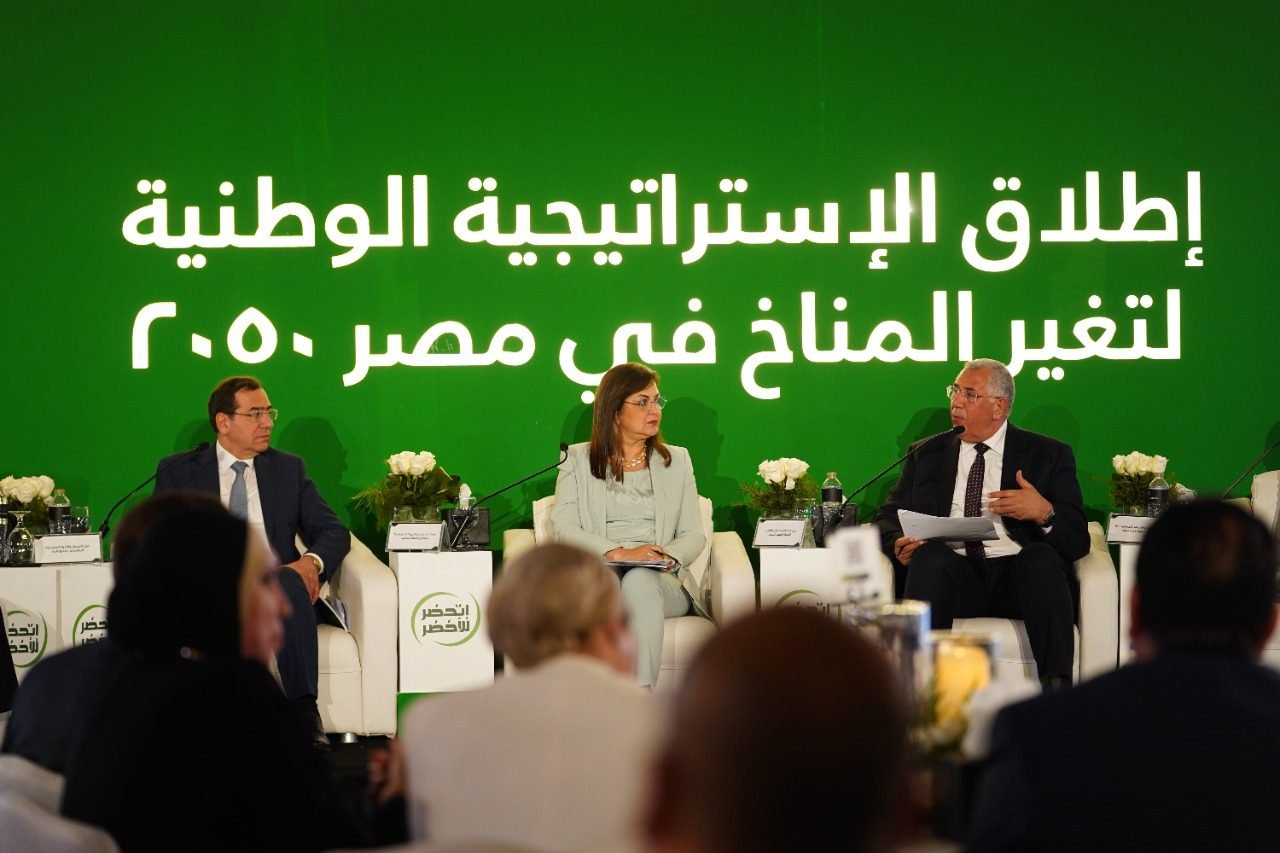The Prime Minister and Chairman of the National Council for Climate Change launches the National Strategy for Climate Change in Egypt 2050 in the presence of the Minister of Environment and related ministers Dr. Mostafa Madbouly, Prime Minister and Chairman of the National Council for Climate Change, launched the national strategy for climate change in Egypt 2050 today at a ceremony organized by the Ministry of Environment This embodies a blueprint for achieving the “third sub-goal of the updated Egypt Vision 2030,” to address the challenges of climate change.
The strategy, which employs a flexible, low-emissions approach, enables Egypt to plan and manage climate change at several levels in a way that supports the achievement of the country’s targeted economic and development goals.
Dr. Yasmine Fouad, Minister of Environment, Ambassador Sameh Shoukry, Minister of Foreign Affairs, Dr. Hala Al-Saeed, Minister of Planning and Economic Development, Eng. Tarek El-Molla, Minister of Petroleum and Mineral Resources, Mr. El Sayed Al-Qusair, Minister of Agriculture and Land Reclamation, Dr. Mohamed Maait, Minister of Finance, Dr. Nevin Gamaa, Minister of Trade and Industry, Dr. Rania Al-Mashat, Minister of International Cooperation, Also Elina Banova UN coordinator and Marina Wes from the world bank and representatives from line ministries have participated in this high-profile event, delegates from the House of Representatives, the Federation of Industries and the United Nations. Also, the representatives from media, civil society and international organization.
Although the percentage of Greenhouse gas emissions released by Egypt is almost 0.6% of the global GHG, Egypt is considered one of the most vulnerable countries to the negative impacts of climate change which affects all sectors especially coastal zones, agriculture, water resources, health, population and infrastructure, this adds an extra challenge to the already existing challenges faced by Egypt in her quest towards achieving sustainable development goals and her vision towards achieving such goals by 2030, as Egypt’s vision 2030 gives importance to addressing climate change impacts by having an integrated sustainable environmental system that enhances resilience and ability to face risks. Egypt has always showed commitment and seriousness at the political level towards combating climate change through signing and ratifying the United Nations Framework Convention on Climate Change (UNFCCC), Kyoto Protocol and Paris Agreement as well as submitting requested periodic reports and communications.
At the institutional level, the National Council of Climate Change was restructured in 2019 to be presided by the Prime Minister, it includes representatives from all governmental bodies as well as civil society. The council aims at formulating and updating a comprehensive National Strategy on Climate Change and linking it with the Sustainable Development Strategy, as well as assembling and focusing all national efforts in the field of Climate Change studies and research. In terms of Egypt’s contribution to emissions reduction efforts, several steps have been taken such as developing a Low Carbon Development Strategy Framework until 2030, which is being updated until 2050 to address national development plans and climate change plans in a consistent framework.
Developing Sustainable Energy Strategy 2035, which aims to increase the share of renewable energy in electricity generation, enhance energy efficiency, and implement several renewable energy projects (such as Wind farms projects, Solar Energy projects with a power of 1.6 Giga Watt in Benban, Aswan), with a future vision for Egypt to be a regional hub for energy through production and export of clean energy directly or through green hydrogen, ammonia etc, Sustainable Transport projects such as the subway and monorail, enhancing Energy Efficiency in Industry, as well as afforestation using treated wastewater, sustainable and smart waste management projects, the infrastructure of the waste management system to accommodate the quantities of waste putting in consideration the future increase in population. Covid 19 pandemic and the current global crisis are new challenges added to what the Egyptian economy already suffering from due to climate change, but the Egyptian government is seeking to join the path of the countries that work on benefiting from this crisis by encouraging climate and environmentally friendly investments, perhaps the most important initiative of the government is the Green Bonds with the value of 750 million US dollars which put Egypt on the sustainable finance map, a guiding framework has also been prepared to integrate environmental aspects in country’s plans and projects with certain percentages.
Dr. Yasmine Fouad, Minister of Environment, affirmed that the national strategy for climate change prioritizes Egyptian citizens’ quality of life, which is consistent with the first strategic objective within Egypt’s strategy for sustainable development. The strategy’s vision ensures citizens are protected from the effects of climate change while preserving the country’s development in a sustainable manner. The vision of the National Climate Change Strategy is as follows:
Addressing climate change ramifications in a way that contributes to improving Egyptian citizens’ quality of life, achieving sustainable development and economic growth, and preserving natural resources and ecosystems, all while strengthening Egypt’s international prominence on climate change.

The minister clarified that the national climate change strategy will support the achievement of the country’s intended economic and development goals by taking a low-emissions approach, noting that Egypt’s Vision 2030 is the strategic umbrella for development in the country, where the national climate change strategy integrates all main and sub-goals related to climate change.
According to Fouad, the strategy is developed through collaboration with all parties concerned, as well as relying on earlier nations’ experiences and varies strategies for countries in comparable situations to Egypt. The strategic objectives were developed largely in agreement with Egyptian Constitution Articles 45 and 46, with attention given to the goals stated in Egypt Vision 2030.
The objectives of the National Climate Change Strategy arose from a review of Egypt’s existing climate change landscape’s strengths and weaknesses in order to address the shortfalls while capitalizing on the opportunities. She further stated that the objectives are based on various sectoral development plans and strategies, as well as the United Nations Sustainable Development Goals and international convention commitments related to climate change.
A local advisory council of national experts, as per the Minister, prepared the strategy in two stages. The first phase involved developing a framework for defining the strategy’s parameters, such as defining the vision, primary and subsidiary objectives, general orientations, policies and instruments, and strategy development procedures. Meanwhile, the second phase contained details, such as a study of important national and sectoral documents and strategies, as well as a review of other developing nations’ plans as case studies to understand the diverse ways adopted by other countries to construct their strategies. The national climate change strategy is comprised of five core objectives, from which a number of sub-goals emerge, which are as follows:
The first major goal is to achieve sustainable economic growth and low-emission development in a variety of sectors.
- Changing the energy landscape by increasing the proportion of renewable and alternative energy sources in the energy mix
- Reducing emissions from the usage of fossil fuels
- Improving energy efficiency
- Adopting sustainable consumption and production patterns to minimize greenhouse gas emissions from non-energy activities
The second key goal is to build resilience to climate change, as well as to mitigate the harmful consequences of climate change:
- Keeping people safe from the harmful health impacts of climate change
- Reducing the potential losses and damage to state assets and ecosystems by protecting them from the effects of climate change
- Protecting the country’s resources from climate change’s consequences
- Having robust infrastructure and resilient services in the face of climate change impacts
- Implementing disaster risk reduction principles
- Preserving and expanding green landscapes
- Improving women’s responses to help them adapt to climate change
The third major goal is to strengthen the governance and administration of climate change
- Defining the various stakeholders’ roles and duties in order to accomplish the strategic objectives
- Strengthening Egypt’s standing in international climate change agreements in order to attract additional investments and opportunities for climate funding
- Revising sectoral policies to accommodate the actions needed to reduce and adapt to the consequences of climate change
- Improving institutional, procedural, and legal arrangements, such as the monitoring, reporting, and verification (MRV) system
The fourth major goal is to improve the infrastructure for financing climate-related initiatives.
- Encouraging domestic green banking and green credit lines
- Boosting the use of novel funding methods that emphasize adaptation measures such as green bonds
- Private sector involvement in climate finance and green employment creation
- Adherence to the Climate Financing Guidelines of Multilateral Development Banks (MDBs)
- Building on the present performance of climate financing programs
The fifth major goal is to support scientific research, technology transfer, knowledge management, and public awareness in the fight against climate change.
- Emphasizing the significance of scientific research and technology transfer in climate change mitigation and adaptation
- Promoting climate information transmission and knowledge management among government agencies and citizens
- Raising climate change awareness among various stakeholders (policy/decision-makers, people, and students)
Yasmine Fouad stated that climate change has become an imperative goal, prompting Egypt to develop its first national strategy for climate change adaptation and disaster effects reduction in 2011, as well as the Low Emission Development Strategy (LEDS) in 2018.
This is additionally the reason for the National Council for Climate Change (NCCC) request to develop Egypt’s first comprehensive national climate change strategy (NCCS) until 2050 to address the negative effects of climate change. The strategy includes ensuring integrated planning among various national and sectoral strategies, working to integrate climate change actions into national planning, incorporating standards of sustainability and green recovery into national planning and budget preparation, and embracing climate adaptation and resilience in infrastructure projects, according to the minister.
The plan will take advantage of the financing opportunities provided by the United Nations Framework Convention on Climate Change, the Paris Agreement, and other climate-related sources. The strategy will utilize existing infrastructure to launch new climate-related initiatives, such as employing the current upgraded and expanded power grid to supply electric cars. Moreover, it includes improving market competitiveness, diversifying the economy, creating green jobs, and strengthening bilateral and multilateral cooperation with countries around the world, international financial institutions.
The Minister of Environment suggested potential funding sources to accomplish the strategy’s goals, with many international sources available under the framework of the United Nations Framework Convention on Climate Change and the Paris Agreement, such as the Green Climate Fund, banks, and multilateral institutions like the World Bank and the African Development Bank. Furthermore, financing might come from bilateral organizations such as the French Development Agency and others, as well as funding from the state budget and supporting private-sector investments, especially through the recent green incentives adopted by the cabinet of ministries. Dr. Yasmine Fouad emphasized that in order to achieve the strategy’s objectives of raising awareness about climate action and promoting the values of volunteer work, Egypt’s national climate change strategy requires the active participation of all segments of society, including NGOs and civil society, rather than just government agencies. Some civil society organizations, in partnership with other key players, participate in afforestation, environmental awareness, and other similar initiatives.










What do you think?
It is nice to know your opinion. Leave a comment.